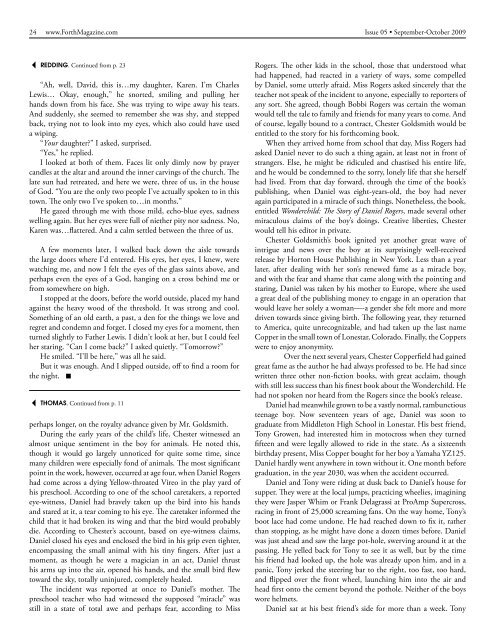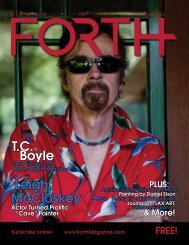John Lithgow: Painter James Ellroy - FORTH Magazine
John Lithgow: Painter James Ellroy - FORTH Magazine
John Lithgow: Painter James Ellroy - FORTH Magazine
You also want an ePaper? Increase the reach of your titles
YUMPU automatically turns print PDFs into web optimized ePapers that Google loves.
2 www.Forth<strong>Magazine</strong>.com Issue 05 • September-October 2009<br />
3REDDIng. Continued from p. 2<br />
“Ah, well, David, this is…my daughter, Karen. I’m Charles<br />
Lewis… Okay, enough,” he snorted, smiling and pulling her<br />
hands down from his face. She was trying to wipe away his tears.<br />
And suddenly, she seemed to remember she was shy, and stepped<br />
back, trying not to look into my eyes, which also could have used<br />
a wiping.<br />
“Your daughter?” I asked, surprised.<br />
“yes,” he replied.<br />
I looked at both of them. Faces lit only dimly now by prayer<br />
candles at the altar and around the inner carvings of the church. The<br />
late sun had retreated, and here we were, three of us, in the house<br />
of God. “you are the only two people I’ve actually spoken to in this<br />
town. The only two I’ve spoken to…in months.”<br />
He gazed through me with those mild, echo-blue eyes, sadness<br />
welling again. But her eyes were full of niether pity nor sadness. No,<br />
Karen was…flattered. And a calm settled between the three of us.<br />
A few moments later, I walked back down the aisle towards<br />
the large doors where I’d entered. His eyes, her eyes, I knew, were<br />
watching me, and now I felt the eyes of the glass saints above, and<br />
perhaps even the eyes of a God, hanging on a cross behind me or<br />
from somewhere on high.<br />
I stopped at the doors, before the world outside, placed my hand<br />
against the heavy wood of the threshold. It was strong and cool.<br />
Something of an old earth, a past, a den for the things we love and<br />
regret and condemn and forget. I closed my eyes for a moment, then<br />
turned slightly to Father Lewis. I didn’t look at her, but I could feel<br />
her staring. “Can I come back?” I asked quietly. “Tomorrow?”<br />
He smiled. “I’ll be here,” was all he said.<br />
But it was enough. And I slipped outside, off to find a room for<br />
the night. n<br />
3THOMAS. Continued from p. 11<br />
perhaps longer, on the royalty advance given by Mr. Goldsmith.<br />
During the early years of the child’s life, Chester witnessed an<br />
almost unique sentiment in the boy for animals. He noted this,<br />
though it would go largely unnoticed for quite some time, since<br />
many children were especially fond of animals. The most significant<br />
point in the work, however, occurred at age four, when Daniel Rogers<br />
had come across a dying yellow-throated Vireo in the play yard of<br />
his preschool. According to one of the school caretakers, a reported<br />
eye-witness, Daniel had bravely taken up the bird into his hands<br />
and stared at it, a tear coming to his eye. The caretaker informed the<br />
child that it had broken its wing and that the bird would probably<br />
die. According to Chester’s account, based on eye-witness claims,<br />
Daniel closed his eyes and enclosed the bird in his grip even tighter,<br />
encompassing the small animal with his tiny fingers. After just a<br />
moment, as though he were a magician in an act, Daniel thrust<br />
his arms up into the air, opened his hands, and the small bird flew<br />
toward the sky, totally uninjured, completely healed.<br />
The incident was reported at once to Daniel’s mother. The<br />
preschool teacher who had witnessed the supposed “miracle” was<br />
still in a state of total awe and perhaps fear, according to Miss<br />
Rogers. The other kids in the school, those that understood what<br />
had happened, had reacted in a variety of ways, some compelled<br />
by Daniel, some utterly afraid. Miss Rogers asked sincerely that the<br />
teacher not speak of the incident to anyone, especially to reporters of<br />
any sort. She agreed, though Bobbi Rogers was certain the woman<br />
would tell the tale to family and friends for many years to come. And<br />
of course, legally bound to a contract, Chester Goldsmith would be<br />
entitled to the story for his forthcoming book.<br />
When they arrived home from school that day, Miss Rogers had<br />
asked Daniel never to do such a thing again, at least not in front of<br />
strangers. Else, he might be ridiculed and chastised his entire life,<br />
and he would be condemned to the sorry, lonely life that she herself<br />
had lived. From that day forward, through the time of the book’s<br />
publishing, when Daniel was eight-years-old, the boy had never<br />
again participated in a miracle of such things. Nonetheless, the book,<br />
entitled Wonderchild: The Story of Daniel Rogers, made several other<br />
miraculous claims of the boy’s doings. Creative liberties, Chester<br />
would tell his editor in private.<br />
Chester Goldsmith’s book ignited yet another great wave of<br />
intrigue and news over the boy at its surprisingly well-received<br />
release by Horton House Publishing in New york. Less than a year<br />
later, after dealing with her son’s renewed fame as a miracle boy,<br />
and with the fear and shame that came along with the pointing and<br />
staring, Daniel was taken by his mother to Europe, where she used<br />
a great deal of the publishing money to engage in an operation that<br />
would leave her solely a woman—-a gender she felt more and more<br />
driven towards since giving birth. The following year, they returned<br />
to America, quite unrecognizable, and had taken up the last name<br />
Copper in the small town of Lonestar, Colorado. Finally, the Coppers<br />
were to enjoy anonymity.<br />
Over the next several years, Chester Copperfield had gained<br />
great fame as the author he had always professed to be. He had since<br />
written three other non-fiction books, with great acclaim, though<br />
with still less success than his finest book about the Wonderchild. He<br />
had not spoken nor heard from the Rogers since the book’s release.<br />
Daniel had meanwhile grown to be a vastly normal, rambunctious<br />
teenage boy. Now seventeen years of age, Daniel was soon to<br />
graduate from Middleton High School in Lonestar. His best friend,<br />
Tony Growen, had interested him in motocross when they turned<br />
fifteen and were legally allowed to ride in the state. As a sixteenth<br />
birthday present, Miss Copper bought for her boy a yamaha yZ125.<br />
Daniel hardly went anywhere in town without it. One month before<br />
graduation, in the year 20 0, was when the accident occurred.<br />
Daniel and Tony were riding at dusk back to Daniel’s house for<br />
supper. They were at the local jumps, practicing wheelies, imagining<br />
they were Jasper Whim or Frank Delagrassi at ProAmp Supercross,<br />
racing in front of 25,000 screaming fans. On the way home, Tony’s<br />
boot lace had come undone. He had reached down to fix it, rather<br />
than stopping, as he might have done a dozen times before. Daniel<br />
was just ahead and saw the large pot-hole, swerving around it at the<br />
passing. He yelled back for Tony to see it as well, but by the time<br />
his friend had looked up, the hole was already upon him, and in a<br />
panic, Tony jerked the steering bar to the right, too fast, too hard,<br />
and flipped over the front wheel, launching him into the air and<br />
head first onto the cement beyond the pothole. Neither of the boys<br />
wore helmets.<br />
Daniel sat at his best friend’s side for more than a week. Tony




